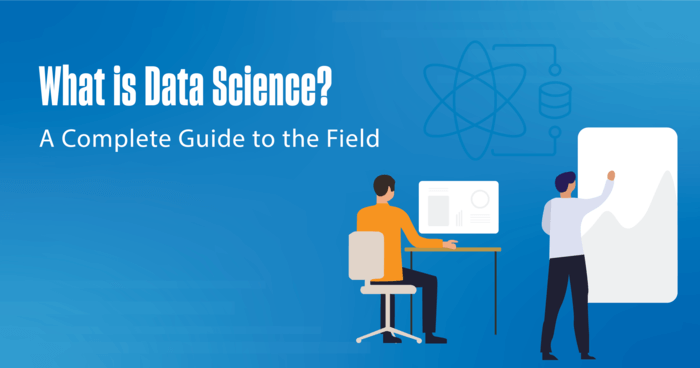In an increasingly data-driven world, data science has become a powerful business tool that’s involved in everything from predicting customer behavior and identifying spending patterns to advancing medical technology and detecting fraud.
This blog post will explore the fundamentals of data science, review common applications, tools, and packages and discuss the essential skills and experience required to be successful in the field.
What Is Data Science?
Data science is a multidisciplinary field that uses scientific methods, algorithms and systems to analyze and extract key insights in order to solve real-world problems and make informed business decisions. With knowledge from math, statistics and computer science, data science involves methods such as machine learning, data visualization and data mining to effectively analyze information.
Here is how some of the top companies in the industry define data science:
“Data science combines math and statistics, specialized programming, advanced analytics, artificial intelligence (AI) and machine learning with specific subject matter expertise to uncover actionable insights hidden in an organization’s data. These insights can be used to guide decision making and strategic planning.” — IBM
“Data science is the study of data to extract meaningful insights for business. It is a multidisciplinary approach that combines principles and practices from the fields of mathematics, statistics, artificial intelligence, and computer engineering to analyze large amounts of data. This analysis helps data scientists to ask and answer questions like what happened, why it happened, what will happen, and what can be done with the results.” — Amazon Web Services
The Data Science Lifecycle
The Data Science Lifecycle is a series of steps that a data scientist will take to work on a particular project or problem. The number of steps and the specifics may vary depending on the resource, but here is the typical flow:
- Identify the problem and clearly define the goals and objectives of the project.
- Define key performance indicators, which will help determine the success or failure of the project.
- Collect data; ensure that it’s accurate and comprehensive.
- Prepare and process the data. This may involve cleaning and transforming the data into a more digestible format.
- Perform an Exploratory Data Analysis (EDA), which involves analyzing and visualizing the data to uncover patterns, trends, anomalies and so on.
- Determine how to model the data. This step involves applying machine learning and statistical techniques to determine how to effectively prepare the data.
- Evaluate to determine the most effective model. Test the model with data to determine its efficacy.
- Deploy the model with real-time data.
- Monitor, evaluate, and maintain the model to utilize it and gain insights that drive strategic business decisions.
Why is Data Science Important?
Much has been said in recent years about the importance of Big Data, with some businesses even referring to it as the world’s most valuable commodity. However, according to training platform SimpliLearn, “without the expertise of professionals who turn cutting-edge technology into actionable insights, Big Data is nothing.”
Data science enables businesses and organizations to transform raw data into meaningful insights in order to make informed, strategic decisions, which can streamline operations, increase efficiency and boost profits.
Applications of Data Science
Consider your typical daily activities: using a navigation application to calculate travel time, researching airfare for an upcoming vacation, scrolling on social media, shopping the latest deals online or browsing Netflix for a new show. Whether you realize it or not, data science supports each one, influencing outcomes and enhancing experiences.
It’s also used in financial sectors to assess risk and prevent and can help reduce downtime in manufacturing.
Here are some common examples of data science in everyday applications:
- Health care — Hospitals use data science, specifically predictive models, to identify patients who are at risk of certain diseases or conditions. They utilize health-specific data to develop personalized treatment plans and analyze data from wearable devices like Apple Watches and Fitbits to monitor a patient’s vital signs.
- Finance — Data from various sources, including social media, can assist financial institutions in making more accurate risk assessments for borrowers. Additionally, monitoring and analyzing consumer behavior enables companies to better target potential markets and clients.
- Sports — From measuring fan engagement and player performance to using analytics to inform fantasy sports and product development, data has become an integral part of today’s sports world.
- eCommerce — Online retailers often rely on data from a customer’s browsing and purchase history to provide product recommendations. They also use data to inform dynamic pricing, predict inventory demand and create targeted marketing campaigns.
Data Science Fields of Study
The field of data science encompasses multiple sub-disciplines such as data analytics, data mining, artificial intelligence, machine learning, and others.
Data Analytics
Data analytics refers to the process of examining raw data to discover patterns and draw conclusions, which can help businesses and organizations make informed, strategic decisions. Data analytics and data science are closely related, but data analytics is more about making the most of the information you already have, whereas data science focuses on exploring new possibilities and designing innovative solutions.
Data Mining
Data mining is the process of sifting through and analyzing data to uncover patterns, trends and correlations. It involves analyzing data from different perspectives and turning that analysis into useful business information.
Artificial Intelligence
Artificial intelligence refers to the ability of machines to replicate human behavior and carry out tasks that require cognitive functions with the use of algorithms and complex systems.
Machine Learning
A subset of AI, machine learning involves extracting important information from data and enabling machines to learn and improve their performance without being directly programmed.
[RELATED] Data Scientist Salaries — High Pay in an Exciting, In-Demand Field
What Does a Data Scientist Do?
The typical responsibilities of a data scientist include:
- Collecting data from various sources,
- Cleaning the data to remove errors or inconsistencies and ensuring that it’s accurate,
- Examining the data to understand any patterns or specific structures,
- Creating machine learning models to make predictions or classify the data,
- Interpreting the results and drawing meaningful conclusions,
- And presenting findings and recommendations to leadership and stakeholders.
Here are some real-life examples of responsibilities pulled directly from job postings on LinkedIn:
- Collaborate with cross-functional teams and senior leadership to define business objectives, identify analytical opportunities and develop data-driven strategies to achieve organizational goals.
- Provide expert guidance and consultation on the application of data science techniques to address key business challenges.
- Stay up to date on the latest developments in data science and industry needs.
- Proactively identify opportunities to apply innovative analytical techniques and emerging technologies to solve business problems and drive competitive advantage.
What Skills do Data Scientists Need?
To excel in data science, you need a broad range of technical and analytical skills. It’s not just about being comfortable with data, but also about having a genuine curiosity to dissect it, analyze its intricacies and leverage it to drive strategic business decisions.
Some of the most common technical skills required include:
- A deep understanding of mathematics, probability and statistical analysis
- Database management
- Programming such as R, Python and SQL
- Data wrangling and preprocessing
- Data visualization
- Machine learning and artificial intelligence
Becoming a successful data scientist involves more than just mastering technical skills. You also need strong communication abilities, critical thinking, attention to detail and effective problem-solving skills.
Additionally, data science is a constantly evolving field, so a commitment to lifelong learning is crucial. It’s also important to understand and address the ethical concerns that arise in the industry.
[RELATED RESOURCE] Master cutting-edge data science tools. Use our guide to select a master’s program that covers essential skills.
Data Science Tools
There is no shortage of data science tools, with more being developed every day by software companies, cloud service providers, open source communities, independent developers and major tech firms such as IBM, Google and Microsoft.
Some of the most common data science tools and packages include:
- Python
- The Natural Language Toolkit (NLTK)
- Matplotlib
- TensorFlow
- Scikit-learn
- R
- D3.js
- KNIME
- Waikato Environment for Knowledge Analysis (WEKA)
- Statistical Analysis System (SAS)
- Tableau
- Apache Spark
- Apache Hadoop
Why Become a Data Scientist?
Data scientists are incredibly valuable to the organizations they serve. And, since data science now touches nearly every industry, you’ll be well-positioned to land jobs in fields that are interesting to you.
Here are some of the reasons you should consider entering this profession:
- High demand, which means strong job security
- Competitive salary with the opportunity to make well over $200,000 for more senior-level positions
- Impactful work that provides the opportunity to discover actionable insights that help solve real-world problems
- The chance to operate a continuously evolving field, which includes new tools, technologies and methodologies
- A flexible work environment with many remote and hybrid positions available
[RELATED] Free Webinar: Get an Inside Look at a Data Science Master’s Degree Program
Data Scientist Career Paths
In addition to data scientist and data analyst, the following closely related positions are also in demand:
- Machine learning engineer: Builds and manages platforms for machine learning projects
- Data architect: Creates and oversees the large-scale management plan for an organization’s current and future data
- Data engineer: Helps build the foundation and infrastructure that enables other team members to transform select data into useable insights and products
- Business intelligence analyst: Transforms data into insights that drive value for their organization and communicates such opportunities to company decision-makers
- Marketing analyst: Interprets and analyzes a company’s data to help inform marketing decisions and strategies
- Statistician: Applies statistical models and methods to certain issues with the goal of developing specific solutions
- Quantitative analyst: Uses mathematical models and statistical techniques to analyze data and inform investment strategies
Data Scientist Career Outlook
Career opportunities for data scientists continue to expand rapidly across a broad spectrum of fields. U.S. News & World Report consistently ranks the position high on its lists of the Best Technology Jobs, Best STEM Jobs and 100 Best Jobs.
The U.S. Bureau of Labor Statistics lists a median salary of $145,080 for data scientists and related positions (with the highest-paid 10% earning more than $233,000). The BLS projects a 23% job growth rate between 2022 and 2032, which is much faster than the national average for all occupations.
[RELATED READING] Data Scientist Salaries — High Pay in an Exciting, In-Demand Field




